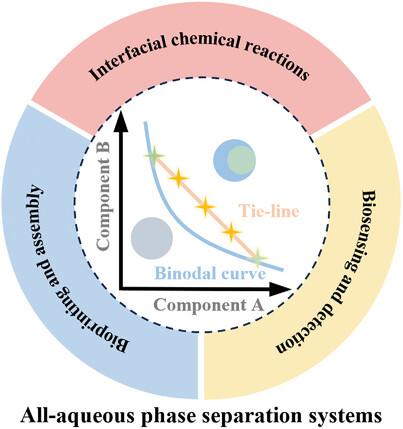当前位置:
X-MOL 学术
›
Adv. Mater.
›
论文详情
Our official English website, www.x-mol.net, welcomes your feedback! (Note: you will need to create a separate account there.)
Affinity‐Controlled Partitioning of Biomolecules at Aqueous Interfaces and Their Bioanalytic Applications
Advanced Materials ( IF 27.4 ) Pub Date : 2024-08-22 , DOI: 10.1002/adma.202409362 Yang Cao 1, 2 , Youchuang Chao 3 , Ho Cheung Shum 1, 2
Advanced Materials ( IF 27.4 ) Pub Date : 2024-08-22 , DOI: 10.1002/adma.202409362 Yang Cao 1, 2 , Youchuang Chao 3 , Ho Cheung Shum 1, 2
Affiliation

|
All‐aqueous phase separation systems play essential roles in bioanalytical and biochemical applications. Compared to conventional oil and organic solvent‐based systems, these systems are characterized by their rich bulk and interfacial properties, offering superior biocompatibility. In particular, phase separation in all‐aqueous systems facilitates the creation of compartments with specific physicochemical properties, and therefore largely enhances the accessibility of the systems. In addition, the all‐aqueous compartments have diverse affinities, with an important property known as partitioning, which can concentrate (bio)molecules toward distinct immiscible phases. This partitioning affinity imparts all‐aqueous interfaces with selective permeability, enabling the controlled enrichment of target (bio)molecules. This review introduces the basic principles and applications of partitioning‐induced interfacial phenomena in a typical all‐aqueous system, namely aqueous two‐phase systems (ATPSs); these applications include interfacial chemical reactions, bioprinting, and assembly, as well as bio‐sensing and detection. The primary challenges associated with designing all‐aqueous phase separation systems and several future directions are also discussed, such as the stabilization of aqueous interfaces, the handling of low‐volume samples, and exploration of suitable ATPSs compositions with the efficient protocol.
中文翻译:

水界面上生物分子的亲和控制分配及其生物分析应用
全水相分离系统在生物分析和生化应用中发挥着重要作用。与传统的油基和有机溶剂基体系相比,这些体系的特点是具有丰富的体积和界面特性,具有优异的生物相容性。特别是,全水系统中的相分离有助于形成具有特定物理化学性质的隔室,因此大大增强了系统的可及性。此外,全水室具有不同的亲和力,具有称为分配的重要特性,它可以将(生物)分子集中到不同的不混溶相。这种分配亲和力赋予全水界面选择性渗透性,从而实现目标(生物)分子的受控富集。本文介绍了典型全水体系(即水两相体系(ATPS))中分配诱导界面现象的基本原理和应用;这些应用包括界面化学反应、生物打印和组装以及生物传感和检测。还讨论了与设计全水相分离系统相关的主要挑战和几个未来方向,例如水界面的稳定、小体积样品的处理以及通过有效方案探索合适的 ATPS 组合物。
更新日期:2024-08-22
中文翻译:

水界面上生物分子的亲和控制分配及其生物分析应用
全水相分离系统在生物分析和生化应用中发挥着重要作用。与传统的油基和有机溶剂基体系相比,这些体系的特点是具有丰富的体积和界面特性,具有优异的生物相容性。特别是,全水系统中的相分离有助于形成具有特定物理化学性质的隔室,因此大大增强了系统的可及性。此外,全水室具有不同的亲和力,具有称为分配的重要特性,它可以将(生物)分子集中到不同的不混溶相。这种分配亲和力赋予全水界面选择性渗透性,从而实现目标(生物)分子的受控富集。本文介绍了典型全水体系(即水两相体系(ATPS))中分配诱导界面现象的基本原理和应用;这些应用包括界面化学反应、生物打印和组装以及生物传感和检测。还讨论了与设计全水相分离系统相关的主要挑战和几个未来方向,例如水界面的稳定、小体积样品的处理以及通过有效方案探索合适的 ATPS 组合物。
















































 京公网安备 11010802027423号
京公网安备 11010802027423号